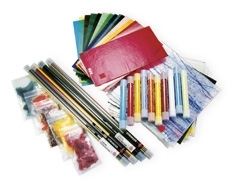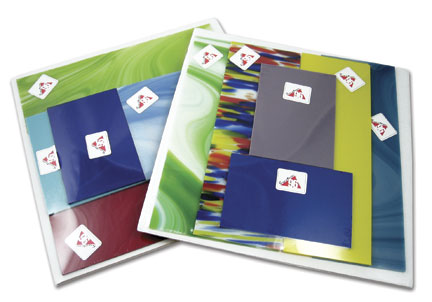Glass Fusing Basics - Is All Glass Fusible?
Can Any Glass Be Fused
In a word NO!
Okay now that we have that out of the way let's talk about glass and fusible glass. Any piece of glass can be melted, after all that's how it got started out isn't it. While any piece of glass can be melted not all types of glass lend themselves to being fused together. Through the years and as fused glass art has matured as an art-formmany manufacturers have created and perfected the process of making compatible fusible glass. Spectrum Glass, Bullseye Glass, Urobros Glass and others now manufacture complete lines of glass for artists to work with.
Without getting into physics and highly technical jargon I'll try to put this topic into plain English for you.
Fusible glass is categorized by the term COE. COE stands for "coefficient of expansion" and it is the standard by which all truly fusible glass is manufactured. Quite simply, the COE of a piece of glass is a measure of how much that particular piece of glass will expand and then contract as it is heated and then cooled. Typical COE's for fusible glass are 33, 82, 90, 96, 104, 108 and 120. Each of these differently rated glasses has characteristics that make it good for one use or another.
For the sake of this conversation we will talk about fusible glass with a COE of 90 or 96. These two types of glass are readily available and lend themselves very well to the beginning glass artist. These particular glasses are found in a wide variety of colors and textures and are available in sheet form at many local glass shops and studios.
Because different types of glass expand and contract at different rates when subjected to the same temperatures they cannot be mixed together in the same project without cracking.

COE 90 Fusible Glass
Glass that is marked as COE 90 has been tested for compatibility with other COE 90 glasses and has some advantages and disadvantages.
Advantages of COE 90 glass include a readily available supply of sheets, rods, and frit in many different sizes. COE 90 comes in a vast array of colors and is suitable for use both in kiln forming and bead making. COE 90 glass is manufactured by many American companies and is in fact produced extensively in the United States. Buy American!
Some disadvantages of working with COE 90 glass are that it has a higher melting point than COE 96 and therefore must spend more time in your kiln. Because of the additional hardness of COE 90 glass it is a bit harder to work with than its' softer counterparts. Sheets of COE 90 glass have a bit more surface texture than a softer COE glass and that makes it more prone to trap air bubbles between layers when it is used in multi-layer projects. This air trapping characteristic is actually sought after by some glass artists as a way to add another elementto their designs. One last disadvantage of working with COE 90 glass is that it is slightly more prone to devitrification than say a COE 96 glass when it is fired multiple times.
A great place to find out more about COE 90 glass is Bullseye Glass.

COE 96 Glass
COE 96 glass is my choice for all my fusing projects, probably because it's what I bought the first time I went shopping for glass. It is widely available at many glass shops in my area and it is another product made by an American manufacturer.
COE 96 glass has some benefits and advantages over other types of glass. One important aspect of COE 96 glass is it's cost, it is priced a little less than most other fusible glasses. COE 96 sheet glass has a consistent texture that makes it very easy to work with, from cutting to grinding and polishing. The smooth surface texture of COE 96 sheet is also less likely to trap air bubbles between pieces of multi-layer projects. COE 96 glass is available in sheets, frit and rods, as well as stringers and noodles.
A major manufacturer of COE 96 glass is the Spectrum Glass Company. They have an extensive web site with all kinds of useful information and they even provide free project instructions and a great FREE newsletter available through local glass shops and studios.
Check out the System 96 Website from Spectrum Glass. It is a fantastic resource for beginners as well as seasoned glass artists.



